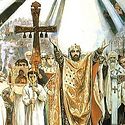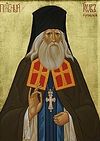

| Previous day | Next day |
| Old Style
July 15
|
Sunday |
New Style
July 28
|
| 6th Sunday after Pentecost. Tone 5. | No fast.
|
![]() Martyrs Cyricus (Quiricus) and his mother Julitta, of Tarsus (ca. 305).
Martyrs Cyricus (Quiricus) and his mother Julitta, of Tarsus (ca. 305). ![]() Holy Equal-to-the-Apostles Great Prince Vladimir (Basil in holy baptism), enlightener of the Russian Land (1015). Synaxis of the Saints of Kiev.
Holy Equal-to-the-Apostles Great Prince Vladimir (Basil in holy baptism), enlightener of the Russian Land (1015). Synaxis of the Saints of Kiev.
Martyr Abudimus of the isle of Tenedos (4th c.). St. Sylvester, bishop of Kanev (1908) Sts. Vladimir and Agrippina, prince and princess of Rzhevsk (ca. 1226).
St. Asiya the Wonderworker, of Tanis in Syria (5th c.). St. Donald of Ogilvy (ca. 716) and his nine virgin daughters, nuns of Abernathy (Scotland). Translation of the relics of St. Swithun, bishop and wonderworker, of Winchester (971). Finding of the head of St. Matrona of Chios (1462). St. Zosima, monk, of Alexandrov (Vladimir) (c. 1713). St. Job (Kundrya), archimandrite, of Malaya Ugolka (Carpatho-Russia) (1985).
Thoughts for Each Day of the Year
According to the Daily Church Readings from the Word of God
By St. Theophan the Recluse

Sixth Sunday After Pentacost. [Rom. 12:6-14; Matt. 9:1-8]
The Lord forgives the sins of the man sick of the palsy. One should rejoice; but the evil mind of the learned scribes says: “This man blasphemeth.” Even after the miracle of the healing of the man sick of the palsy—a confirmation of the comforting truth that the Son of man hath power on earth to forgive sins—the people glorified God; but nothing is said about the scribes, probably because they continued to weave their deceitful questions even after such a miracle. The mind without faith is a schemer; it constantly hammers out its evil suspicions and weaves blasphemy against the whole realm of faith. As for miracles—it either doesn’t believe in them, or it demands a tangible one. But when a miracle is given that would obligate one to submit to the faith, this mind is not ashamed to turn away from it, distorting or slandering the miraculous works of God. It treats irrefutable evidence of God’s truth in the same way. It is sufficiently and cogently presented with both experiential and intellectual proof, but it covers even this with doubt. Sort out all that it produces and you will see that in this there is only deceit, although its own language calls it cleverness, and you are unwillingly led to the conclusion that cleverness and deceit are one and the same. In the realm of faith the Apostle says, We have the mind of Christ. Whose mind is outside of the realm of faith? The evil one’s. That is why deceit has become its distinguishing characteristic.
Articles
 St. Sylvester, Bishop of KanevHis contemporaries note that in him they saw the ancient ideal of a saint—both a teacher of faith and a model of true piety. |




